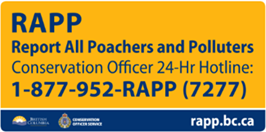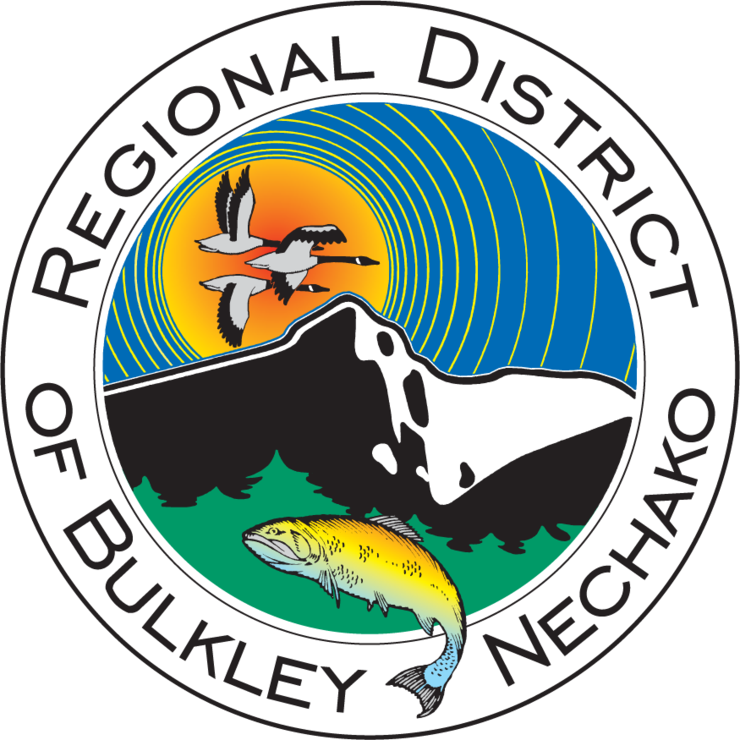Illegal dumping creates risk to public health, safety, the environment, and the economy. Impacts also include increased risk of wildfire, water contamination, and injury to people and wildlife.
To report illegal dumping, please use the BC Conservation Service's RAPP (Report All Poacher and Polluters) Hotline.
Reports can be made by phone at 1-877-952-RAPP (7277), or online at https://forms.gov.bc.ca/environment/rapp/
Many items that are found illegally dumped are accepted at RDBN Transfer Stations or Landfills free of charge. Please see the list below for Accepted Materials at RDBN Facilities.

CLEANING UP ILLEGAL DUMP SITES
The RDBN encourages and supports community clean-ups where possible. If you are interested in organizing the clean-up of an illegal dump site, please call the RDBN at 1-800-320-3339 for assistance.
For any questions about where or how a specific type of waste can be disposed of, call the RDBN at 1-800-320-3339, or email waste@rdbn.bc.ca.
Click on the material you need to dispose of to find locations it can be accepted:
-
Small loads of household or commercial waste
-
Any RDBN Transfer Station can accept general waste from households, as well as commercial, institution, or industry operations, at no charge.
Household waste is defined as waste generated from a household or dwelling, consisting of food waste, packaging, recyclables, non-recyclables and other household materials.
Commercial waste, which includes waste from businesses, institutions, and industry, is defined as waste generated at a commercial building or retail store consisting of food waste, packaging, recyclables, non-recyclables and items that are generated through business operation.
-
Industrial Waste
-
Industrial waste, a byproduct of industry, is NOT accepted at any RDBN waste facility. Industrial waste means solid waste materials discarded from extraction, harvesting, manufacturing, processing, or production of goods and products. This is including, but not limited to, waste generated from industrial operations such a forestry, pulp and paper, mining, fisheries, oil and gas and food processing.
-
Demolition, Renovation and Construction Waste (DRC)
-
DRC waste is generated by households, institutions, commercial and industry entities. This waste is accepted at all RDBN Transfer Stations free of charge in amounts of 2 m3 or less. It is encouraged that large DRC project loads be brought to an RDBN Landfill. Please contact the RDBN to request disposal.
DRC in amounts greater than 2 m3 will be charged $90/metric tonne and must be brought to an RDBN landfill.
DRC means largely inert solid waste generated from construction, remodling, repair, and demolition of structures, roads, sidewalks and utlities.
Please see our Asbestos Disposal page for more details on the DRC screening process for disposal of this material.
-
Recycling
-
Residential recycling bins are located at all RDBN Transfer Station and Recycling Depots.
The following clean, non-contaminated items can be recycled:
- cartons and containers including plastic containers, steel packaging, aluminum containers and paper packaging that holds liquid
- empty and rinse the containers, leave the labels on and place loose in the recycling bin without caps, pumps or lids (metal lids should be tucked into flattened cans)
- mixed paper including cereal boxes, envelopes, flyers, magazines and egg cartons with no plastic, foil or wax attached
- corrugated cardboard (has a rippled layer sandwiched between two boards)
- cartons and containers including plastic containers, steel packaging, aluminum containers and paper packaging that holds liquid
-
Scrap Metal
-
Small loads of metal can be recycled at any RDBN Transfer Station.
This includes:
- appliances like freezers, stoves, dishwashers, washers and dryers.
- barbeque hulks, bicycle frames, lawn mower, motorcyle and snowmobile frames, as long as the fuel, lubricants and tires are removed.
- metal roofing and siding
- steel drums or tanks as long as they are cut, crushed or perforated.
-
Wood Waste
-
Wood waste, including painted, stained, or glued items, is accepted at the wood piles at all RDBN Transfer Stations.
Creosote treated wood, such as railway ties, telephone poles and dock pilings are not accepted.
-
Animal Carcasses
-
There is a limit of one large animal per day except for cows/calves. There are specific federal rules and regulations regarding the disposal of cow carcasses/parts. Please contact the Regional District prior to disposal. Carcasses in larger amounts can be taken to the landfill with prior authorization and associated fees may apply. This includes cows/calves which are a Specified Risk Material (SRM).
-
Bulky Waste
-
Bulkly waste is items with a volume greater than 2 cubic meters when crushed, including, but not limited to: recreational vehicles, pre-fabricated homes, trailers, watercraft and other large articles. Auto hulks must have fluids, batteries and tires removed. These items require 48 hours prior notice and must be deposited a minimum of one hour before landfill closing time.
-
Land Clearing Waste
-
Defined as residual wastes and vegetation produced from land clearing and grubbing, utility maintenance, and seasonal or storm-related cleanup, including but not limited to stumps, tree-trunks, branches, and wood chips.
- Land clearing waste in amounts less than two cubic metres (2m3) will be accepted for disposal at all Regional District Landfills and Transfer Stations free of charge.
- Land clearing waste in amounts greater than 2m3 will be charged $90 per tonne and must be taken to the landfill.
-
Controlled Waste Items (must be separated from other waste)
-
Contact the RDBN at 1-800-320-3339 for information on how to dispose of these materials:
- fencing wire
- fireplaces ashes
- fuels
- asbestos
- ignitable waste
- liquids
- lubricants
- paints and solvents
- pesticides
- sewage sludge
- special waste (Provincial Regulation)
- steel or plastic drums if they are not cut, crushed or perforated
-
Prohibited Waste (not accepted at any RDBN Facility)
-
Contact the RDBN at 1-800-320-3339 for information on how to dispose of these materials:
- Biomedical waste
- Regulated recyclable waste (OCC)
- Free liquids
- Hazardous waste (exception - asbestos via landfills)
- Industrial waste
- Waste on fire or smouldering
- PCBs
- Radioactive waste
- Chemical waste
- Explosives
